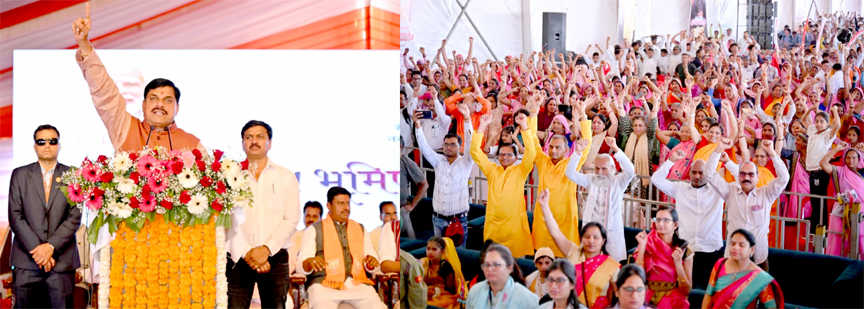Sufi tradition of Chishty order adds to the Indian tradition of unity in diversity
Sufi tradition of Chishty order adds to the Indian tradition of unity in diversity
Haji Syed Salman Chishty
“Al-khalq ayal Allah.” A blessed saying of the Prophet Muhammed teaches us that the entire humanity is the family of God. Ajmer Dargah Sharif, a sacred space for the human family to meet and greet each other and pray together for Peace for the contentment of one’s inner being, is the embodiment of this dictum of “Love towards All, Malice towards None”.
Lakhs of people have been following the noble teachings of 11th Century Sufi Saint Hazrat Khawaja Moinudeen Chishty Gharib Nawaz whose shrine Dargah Ajmer Sharif is located in the heart of Rajasthan, relive and walk this sacred path every single day since last 800 years.
His message is of unconditional Love towards All; unity in Diversity and this creed is one of the greatest spiritual strengths of our blessed nation – India.
The rich tapestry of India’s spiritual cultural and religious landscape is woven with diverse threads, and one significant thread that runs through the history of Indian Muslims is Sufism. Sufism, a mystical and inward-focused dimension of Islam, has not only left an indelible mark on Indian Muslims but has also played a pivotal role in fostering unity in diversity.
Sufism is indeed an important aspect of Islamic spirituality and has had a significant influence on Muslim communities around the world, including in India where the Indian Muslim population has been highly influenced and live by the noble teachings of Sufi Saints across India as the regional Indian Muslim population is diverse and spiritual practices vary among individuals and communities from Kashmir to Kanyakumari and Gujarat to West Bengal.
The influence of Sufism, particularly the Chishty Sufis, has been on almost 80 percent of the Muslim population in India, highlighting the importance of their legacy and why Indian Muslims should take pride in it.
Sufism represents a mystical and inward-focused dimension of Islam, emphasizing spiritual development, love for God, and the pursuit of a deep personal experience of the Divine. Sufi teachings indeed promote values such as peace, harmony, tolerance, and inclusivity which celebrate Unity in diversity.
In the Indian context, Sufism has a rich history and has played a significant role in shaping Spiritual traditions and the cultural fabric of the country. Many Sufi (tariqas) have historically played a crucial role in the development of Spiritual Practices and Mystical Dimensions of Faith perspectives while contributing to local cultures and societies. Prominent Sufi saints, such as Hazrat Khwaja Moinuddin Chishty of Ajmer Sharif and Hazrat Nizamuddin Auliya of Delhi, are revered by people of various faiths for their message of love, harmony and unity, and diversity. Sufi shrines across India continue to be important centers of spiritual practice and cultural exchange.
Indian Muslims, like people of any religious or cultural background, have a diverse heritage to be proud of, including their contributions to various fields such as art, literature, science, and social development as well as nation-building initiatives and achievements. It is essential to appreciate and celebrate the diversity within the Indian Muslim community and recognize the contributions of individuals and groups while avoiding sweeping generalizations.
Sufism’s influence on Indian Muslim culture cannot be overstated. Throughout history, Sufi saints and their mystical teachings have left an indelible impact on the religious and cultural fabric of the country. Sufi poetry, sacred music, and meditation have become integral parts of Indian Muslim traditions, serving as expressions of devotion and vehicles for spiritual upliftment.
One of the remarkable aspects of Sufism is its ability to transcend religious and cultural boundaries, fostering unity in diversity. Sufi saints, such as Khwaja Moinuddin Chishty at Ajmer Dargah Sharif and Hazrat Nizamuddin Auliya of Delhi, exemplify this spirit of inclusivity. Their dargahs (Sufi shrines) have become sacred spaces that attract devotees from various faiths, fostering interfaith harmony and mutual respect. The message of unconditional love, compassion, and unity propagated by these Chishty Sufi Masters has played a pivotal role in strengthening the social fabric of India.
Khawaja Moinudeen Chishty Gharib Nawaz said: “He indeed is a true devotee, blessed with the love of God, who is gifted with the following three attributes: Sun-like grace, i.e., his affection may be extended indiscriminately to all like sunlight; river-like Generosity, i.e., his sense of charity has no limits and is equally beneficial to all the creatures of God who approach him, and earth-like hospitality, i.e., his loving embrace may be open to all like that of the earth.”
The Chishty Sufis, in particular, have left an indelible mark on Indian Muslims. Their teachings emphasized love, humility, and service to humanity. They practiced what they preached, transcending social and cultural barriers as even today by serving pure vegetarian langar meals to millions of seekers visiting the Chishty Sufi Shrines across India daily. Their teachings and the spiritual practices they imparted created a sense of unity among their followers, regardless of their backgrounds. The Chishty Sufi Masters laid a strong foundation of unity in diversity across India, where people of different religions and castes came together under the banner of spirituality.
Chishty Sufism’s impact on Indian Muslims extends beyond the realm of spirituality. It has deeply influenced various artistic and cultural forms, creating a unique synthesis of Islamic and Indian traditions. Sufi music, such as qawwali spiritual renditions of mystical hymns and spiritual songs with the narration of stories as part of daily meditational practices across the Sufi shrines in India, an incredible Chishty legacy deeply synchronized as oral traditions of sharing and shaping the society with spiritual anecdotes as it captivates seekers, audiences with its devotional fervor and melodic richness. The poetry of Sufi saints is primarily expressed in languages like Hindvi, Persian, Brij Bhasha, Awadhi, Bangla, Marathi, Khadi Boli, Urdu, and Punjabi. It also emerges as a musical genre that propels similarities between faith, culture, and devotion in Hinduism and Islam.



